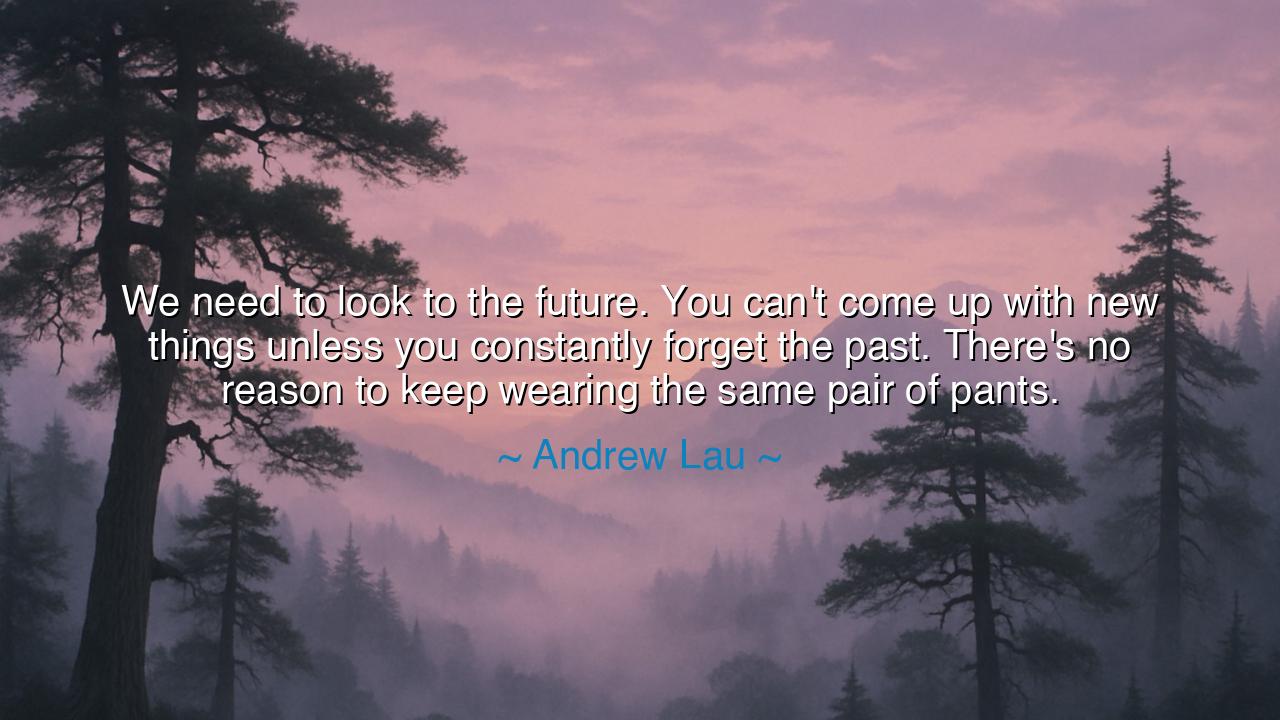
We need to look to the future. You can't come up with new things
We need to look to the future. You can't come up with new things unless you constantly forget the past. There's no reason to keep wearing the same pair of pants.






“We need to look to the future. You can’t come up with new things unless you constantly forget the past. There’s no reason to keep wearing the same pair of pants.” So declared Andrew Lau, the visionary filmmaker behind Infernal Affairs, a man whose stories pierced through the shadows of crime and conscience to reveal something deeper about creation and renewal. His words, though wrapped in simplicity and humor, bear the weight of ancient wisdom. For in them lies the eternal struggle between memory and progress, between what is known and what is possible. Lau reminds us that the path of creation is not paved with nostalgia, but with courage—the courage to let go, to cast off the garments of yesterday, and to stride naked and unafraid into the unknown future.
To “look to the future,” as Lau says, is not to despise the past but to refuse to be enslaved by it. The past is a teacher, yes—but not a master. It offers wisdom, yet if we cling to it too tightly, that wisdom becomes a chain. Innovation demands forgetting, not in the sense of ignorance, but of release. Just as a tree must shed its old leaves to bloom again, so must the human mind cast aside its worn patterns of thought. To “keep wearing the same pair of pants” is to mistake comfort for growth, to confuse familiarity with truth. The artist, the thinker, the dreamer—these must always change their garments, always remake themselves, or else risk becoming relics of their own making.
This philosophy is not new; it is as ancient as the dawn of creation itself. The sages of the East spoke of impermanence as the heartbeat of the universe. The river, they said, is never the same from one moment to the next, and yet it remains a river. In the same way, life flows forward only when it allows itself to change. To resist this flow is to stagnate, to decay. Andrew Lau’s wisdom, though spoken in the language of cinema, echoes this cosmic truth: that to renew the world, one must first renew the self.
Consider the story of Pablo Picasso, one of the great artists of modern history. At the height of his fame, when his blue period had won him praise and his cubist visions had changed the world, he did not rest upon his past. He destroyed his own style, reinvented his art, and forced himself into discomfort again and again. When asked why he abandoned what had made him great, he said, “Every act of creation is first an act of destruction.” He, like Lau, understood that the future is not born from clinging to yesterday’s triumphs, but from the boldness to forget them and begin anew.
The same truth has shaped civilizations. When Japan rose from the ashes of war, it did not rebuild its past—it reinvented its future. Through innovation and reinvention, it transformed from ruin to one of the world’s most advanced nations. This was not because it forgot its spirit, but because it was willing to let go of its form. It traded the old garments of pride and tradition for new ones of creativity and progress. That is the essence of Lau’s teaching: the form may change, but the spirit endures.
Yet this act of renewal requires immense courage. To forget the past is to step into uncertainty, to face the blank page, the silent stage, the empty canvas. It is far easier to dwell in the comfort of what has already been built, to wear the same “pair of pants” and call it wisdom. But the world belongs not to the cautious, but to the daring—to those who are willing to shed their old selves and embrace transformation. Whether in art, in science, or in the quiet labors of daily life, those who move the world forward are those who do not fear to begin again.
So, my listener, let this be your lesson: Do not cling too tightly to what you have been. The past is a foundation, not a fortress. Learn from it, honor it, but then step beyond it. Change your garments when they no longer fit your spirit. Create something new—not because it is easy, but because it is necessary. Let your heart, like a river, flow freely toward what is next.
And when the world tempts you to hold still, to repeat what is safe and familiar, remember the wisdom of Andrew Lau: The future belongs to those who dare to forget. For the one who constantly renews himself, who burns the old to kindle the new, lives not in the shadow of yesterday—but in the radiant fire of tomorrow.






AAdministratorAdministrator
Welcome, honored guests. Please leave a comment, we will respond soon